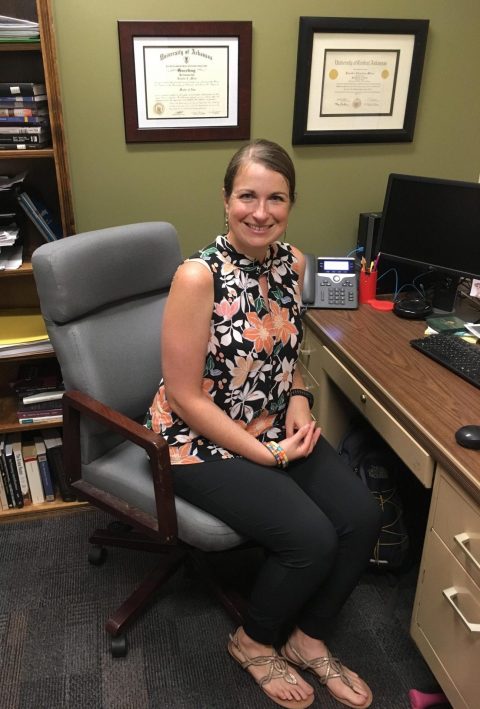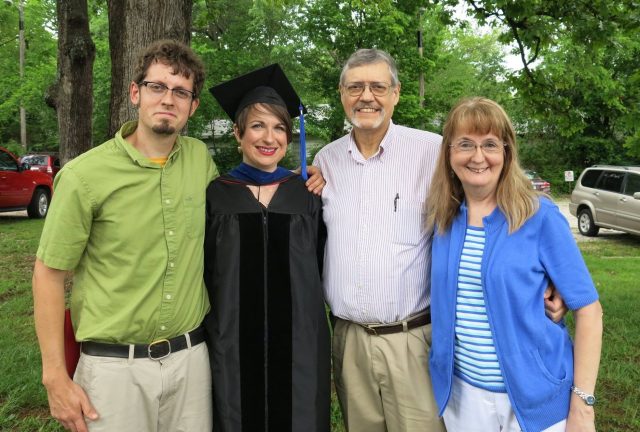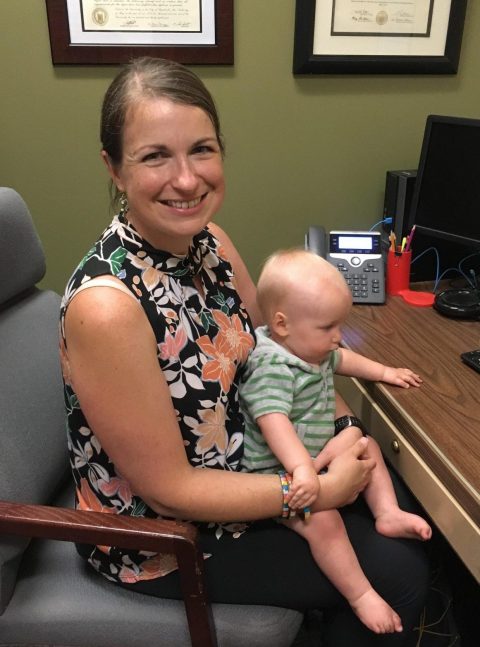Jenn Mallette Talks about Life on the Tenure Track

First, I have to confirm: In this site’s April alumni profile blog entry on Jeremy Burns (Ph.D., ’14), he states, “One of the smartest things I ever witnessed was a graduate peer of mine branching out to work at the intersections of rhetoric, feminism, and engineering. She waltzed into a tenure-track job and is, I assume, enjoying the fruits of her early labor.” He is referring to you, correct?
It would appear that he is! I would not characterize my progress into a tenure-track position as a waltz (or as particularly focused on making myself uniquely marketable), but the ways I pursued interests in engineering communication, feminism, and the rhetoric of science certainly paid off, as did cultivating interests in writing program administration and other areas. A lot of it was recognizing where I could leverage my interests in ways that others would find appealing, which some people might balk at but is actually something we should all be doing. It doesn’t mean giving up values or principles but recognizing that others outside of our areas of interest need to know how our work is valuable in a variety of broader contexts. Everyone loves some practical applications, which give access to our research that might often seem inaccessible to a broader audience.
On a related note about marketability: One of the people I interviewed with later told me that they were impressed with the fact that I pursued research in technical communication despite the lack of a program or coursework (at the time) at our institution. This told them that I was committed to a course of study and I was willing to branch out on my own without directly working under someone in the field, and they liked that and what it said about my tenacity and ability to work independently.
Second, as Jeremy implies, your combination of rhetoric and composition studies, feminist theory, and the field of engineering was a rather unexplored topic at the time, yet that choice of research focus clearly paid off as you were offered an assistant professor position before you graduated. How did you decide to bring together those different areas for your dissertation project? Were you nervous about going where few scholars had previously ventured?
I’d like to think I was consciously savvy or set out to work in a new area, but it was a mix of coincidence and being the kind of person who likes to connect various ideas that may seem disconnected. At the time, I was reading a lot about gender and communication, teaching that gender/writing FYC course, and talking with engineering professors and with David Jolliffe. I’m always hunting for connections, and in this case, I had been talking to a smart engineering professor and a professional outside academia, who were both good friends, about engineering writing and gender. I made some off-handed comments to David about some ideas, and he picked up on a thread of possibility and nudged me in that direction. From there, it was my interest in exploring women’s experiences in connection to writing that helped me develop it into a project. Some of it will be discussed in my article in the forthcoming issue of The Journal of Business and Technical Communication, which you can read right now online!
I wasn’t nervous about diving into an unexplored area as much as I was afraid I’d missed something: there’s a lot of research about women in engineering and science, research about writing and engineering, and research about gender and writing, but not so much about women’s experiences as writers in engineering. My tendencies for reading in a variety of disciplines paid off a bit, as I was able to draw these areas together to explore my research questions. I think that researchers shouldn’t shy away from digging into connected fields and using theories or concepts that help them make sense of what they see in front of them–without my interests in gender and science, the rhetoric of science, and gender and communication, I may have ended up with a different project altogether, and not one that I’m still excited to continue exploring.
By the way, congratulations on the recent publication (in the journal Composition Studies) of your article “He Said, She Said: Gender and Academic/Professional Writing”! This piece looks back on your experience teaching a special topics section of Composition II while you were still a graduate student. Could you speak a little to the issue of publishing articles and how important you feel that form of professionalization to be for current graduate students, especially those who are planning to pursue tenure-track jobs of their own?
This article emerges from a course design I created for Pat Slattery’s Composition Theories class, which I submitted because David Jolliffe made sure we knew about this publishing opportunity. It was initially turned down, though the editor of Composition Studies gave me great feedback and encouraged me to consider resubmitting (or submitting elsewhere). So, I revisited the theory I used, updating it to focus more on current gender theory and research on the ways women communicate, and it was accepted.
This process–rejection, criticism, revision, resubmission–is often scary for graduate students (or any of us in academia!) because it requires you to send ideas and writing out to be exposed to criticism. The more you do it–send stuff out, get feedback, and keep tinkering–the stronger you get as a writer and scholar. Our ideas cannot exist in a vacuum, so if we think about this process as less about our individual ideas and more about how to connect with the ongoing conversations, the less mystical it becomes (and the less scary critiques can be). I think I waited almost too long to engage in this form of professionalization, and I wish I’d started a bit sooner. (Though, I was active in presenting at conferences throughout my entire PhD program.) Given the nature of the current job market, it’s essential to send stuff out and demonstrate that you can engage with your field as a scholar–it’s what a lot of people look at in a job candidate, even in rhetoric & composition/technical communication. And entering a TT job with an understanding of that process will help make the first few years in the position easier.
Here is where advisors and mentors are crucial, whether they are professors at your institution, a mentor you trust to be honest, or other scholars/graduate students who work in your area. I had the great fortune of working with David and other professors in the department who were encouraging and willing to offer advice and feedback. I also have mentors in my field–for instance, Marie Moeller, a scholar in tech comm/feminism gave me awesome feedback on an early draft of an article and pointed me to new theories to use, which allowed me to deepen my analysis. (We were connected at a mentoring event through the Feminisms and Rhetorics conference). That article was accepted with minor changes, which isn’t too common, but would not have happened had I not pursued opportunities for mentoring in a number of areas and gotten rich feedback from readers. Take advantage of the variety of mentors available locally, and consciously seek out different kinds of mentors through conference events and professionalization opportunities.

Mallette after Her Graduation from the English Ph.D. Program at the University of Arkansas in 2015
Any tips for what to do/what not to do when interviewing for a tenure-track job?
DO NOT go on the market with only 2 (ish) chapters of your dissertation finished. I thought I’d be able to write more prior to interviews, but applying for jobs (and interviewing) took so much of my time and energy that I really couldn’t focus on it until I had an offer in hand. I had to talk about my dissertation as a finished product when it was still in formation; while the process of constructing the coherent narrative about my dissertation helped me map it out (and allowed me to finish it rapidly after getting my job offer), it was a miserable experience, and I hated not being able to talk about it as a finished product.
In terms of what to do, know when to throw out advice you’ve been given. Much of that advice is good, but it doesn’t always work for everyone. I was told that as a young woman, I should avoid talking about my partner…but it felt so weird and wrong to avoid talking about a significant person in my life who would be directly affected by my choice as well as what both of us were interested in or how we would connect to the place. So, after the first campus visit, I stopped trying to avoid bringing him up (if it made sense in the conversations, anyway). I also realized that, for me, I would be miserable on a campus where they thought a woman with a family was a liability, so I decided that it was worth letting my potential future colleagues understand that I valued work/life balance in various ways. Other advice I broke: don’t eat food with your hands (totally did that and don’t regret it) and other things that would require me to act in ways that felt unnatural or made me self-conscious.
One thing I did do that felt natural: get a sense of the department culture outside of research/teaching. At my Boise State interview, I got the sense that they were active (Boise is an outdoorsy place), so I asked if anyone might like to run with me. I had several faculty members take me up on the offer, so I got to run with my future colleagues in tech comm and my department chair. (She later told me that it showed that I knew what I wanted in a place). However, I didn’t do that anywhere else, based on my sense of the interests of those in the department. At another visit, I was asked if I was interested in seeing some of the surrounding areas, and I enthusiastically agreed–not only did I have a pleasant time seeing new parts of the US, but I also got to visit at length with an amazing scholar in the field and all-around awesome person.
Last piece of advice: roll with the situation. You should be well-prepared before going into a Skype or on-campus interview, and you can fall back on that preparation if something goes wrong. For one of my Skype interviews, the interviewers couldn’t get the technology to work, and the light kept going off in the office I was using to interview. Instead of panicking, I just laughed it off and joked lightly with the interviewers, which helped me relax (and showed I could handle glitches professionally). I got the campus interview for that job (and the job offer!). For another campus interview, the computer decided to reboot in the middle of my job talk, but instead of freaking out about losing my slides, I kept going and kept my cool, which the interviewers were also impressed with. A worse story? A friend of mine slipped on ice and split his pants in an interview, but managed to salvage the day. Something will likely go wrong at some point, but not letting a glitch throw you off your game, or simply asking for what you need in that moment (like having to stop, on the way back to campus after breakfast, for the deodorant I forgot to apply), can help you keep your cool and be successful.
What were two specific experiences you had at the U of A, as a graduate student, that you feel most significantly prepared you to handle the responsibilities of being a professor?
I’d have to say the opportunities for course design and conference funding. For the first, we were given a lot of latitude to develop even first-year writing courses to best suit our strengths (within a framework, of course). The chances to develop special topics courses and to teach upper-level courses were invaluable (I taught two special topics Comp II courses–Science Writing and Gender/Academic Writing–as well as advanced composition and a 3000-level technical communication class). When I was on the market, I could point to these classes as examples of my teaching experience and curriculum design ability, and what I learned from teaching a variety of classes over 5 years allowed me to adapt to having to teach a new course each semester.
We were also fortunate to have funding to attend academic conferences. With this funding, I was able to present at national conferences and begin forming connections with other graduate students across the country and those scholars who would become mentors. For instance, in attending CCCC [Conference on College Composition and Communication], I joined an engineering special interest group (SIG) and a science writing SIG, which I later helped bring together into one standing group. My involvement in these SIGs helped me connect to other scholars in these areas, find people with whom to propose panels to future conferences (which were accepted), and allowed me to meet Mya Poe, who was the outside reader on my dissertation and is currently one of my mentors. I’m a huge proponent of mentorship, and if you do conferences right, you find individuals who can become mentors to you (and others whom you can then mentor). Also, conferences are a blast: I love talking about my research, hearing lots of wonderful presentations, and meeting up with colleagues and friends who live all over.
What is one of the best things about living in Idaho and, also, being a faculty member with Boise State’s Technical Communication Program (part of that university’s English Department)?
I am a member of a department who is sincerely invested in my success as a faculty member and who encourages me to have a life outside of my job. As such, I feel incredibly supported and have both formal and informal mentors. For instance, I just sent some course materials to two of my colleagues in technical communication, and they gave me great feedback that will help make my class stronger. My tech comm mentor is happy to give me feedback on proposals, course materials, and anything else I send his way, as well as answer questions. Best of all, my department demystifies the tenure process, so it’s not scary: the guidelines are clear, and each year the evaluation process is less about criticism and more about supporting the work I’m doing.
I also really love Boise, Idaho: it reminds me a lot of Fayetteville in terms of the opportunities for interesting engagement with art, music, books (I got to see Denis Johnson speak!), and availability of fun outdoors activities. It’s a great city to live in, and I was lucky that the place I wanted to live had a job I was excited about taking.
I know that you recently welcomed a new baby into your family. (Congratulations!) As you know, we typically have several graduate students, at any one time, with children of their own. While it can be a challenge to balance parenting responsibilities with graduate school deadlines, that experience–any, really, that forces students to step away from the classroom every so often to attend to the needs of themselves as well as the needs of others–can likewise allow one to gain important perspective on the graduate school experience. Would you agree? Any other advice you can give on how to stay healthy and happy as a graduate student?
Oh man. Having a baby as a pre-tenured faculty was tough–I couldn’t imagine having done this in graduate school! (Though I know lots of folks who did–and who were successful!)
However, I do agree that graduate students should be encouraged to balance their personal lives with the demands of completing the program. I was fortunate that I learned that early (even without a kid) and I cultivated interests outside of graduate school (socializing, running, barre3, and other hobbies), which allowed me to be healthy and happy, even when I was facing the stress of balancing the job market, writing, and teaching.
All graduate students–with or without children–should make sure to acknowledge their own needs and values. It’s easy to get sucked into the idea that to be successful, one must be reading and working constantly, but that perspective leads to burnout. A healthier mindset is to work hard, but also to take time off to do things you enjoy doing or spend time with friends and family. As a new mom, I had to recognize that focusing on my baby was what I needed to do early on (and put scholarship temporarily on the backburner), but now that he is older, I am creating a schedule that will allow me to get my work done but also spend time with him (basically, avoiding work on weekends). I’m making sure to build in time to hike, for instance, since I enjoy exploring all the trails around Boise, and it allows me to spend time with my husband and with my son outdoors, which we all love.
This attitude doesn’t mean that I’m not working hard enough. In fact, Kerry Ann Rockquemore, president of the National Center for Faculty Development & Diversity, argues that part of success is cultivating a work/life balance where we can be productive scholars and committed teachers but we can also have a life off-campus. Faculty (and graduate students) who do so are happier and are able to be more successful. So, don’t mistake working all the time with success–to be able to sustain a career and scholarly productivity, we all have to make sure we’re attending to our personal needs.

Mallette with Her Son in Her Office at Boise State University
